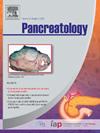P62/Sequestosome1缺乏会破坏急性胰腺炎期间的抗氧化和应激稳态,但不会加剧炎症。
IF 2.7
2区 医学
Q2 GASTROENTEROLOGY & HEPATOLOGY
引用次数: 0
摘要
背景:急性胰腺炎(AP)是一种常见的胰腺炎症性疾病,其发病机制复杂,特异性治疗方案有限。选择性自噬适配蛋白p62/sequestosome1在细胞应激反应中发挥了关键作用,新出现的证据表明它在调节感染驱动和无菌炎症中的作用。然而,p62在AP发病机制中的作用尚不清楚。方法:为了研究p62在AP中的作用,我们制造了胰腺特异性条件敲除小鼠(p62ff;Ptf1acre/+),并通过12次反复腹腔注射蓝蛋白诱导AP。小鼠在最后一次注射后1 h或8 h处死。采用免疫组织化学、qRT-PCR和western blotting技术,评估胰腺损伤与血清淀粉酶水平、胰腺内胰蛋白酶活性、促炎细胞因子、抗氧化基因、内质网应激和细胞死亡标志物。结果:p62ff;Ptf1acre/+小鼠生长正常,胰腺发育正常。在cerulein攻击后,p62敲除小鼠和对照组小鼠均出现类似的胰腺损伤,在组织学评分、淀粉酶或胰蛋白酶活性方面没有显著差异。然而,p62缺陷小鼠的抗氧化反应明显受损。值得注意的是,Nqo1表达减少,Keap1积累,表明Nrf2信号通路中断。铁下垂标志物也显示出基因型和时间依赖性的变化:GPX4在1 h时减少,而FTH1在p62缺陷小鼠中无显著差异。周期性酸-希夫染色进一步显示敲除小鼠糖原消耗增加,表明代谢应激升高。结论:这些研究结果表明,尽管p62缺失不会影响AP的总体严重程度,但它会损害氧化还原稳态和代谢恢复,从而突出了p62在胰腺损伤过程中的保护作用。本文章由计算机程序翻译,如有差异,请以英文原文为准。
P62/Sequestosome1 deficiency disrupts antioxidant and stress homeostasis during acute pancreatitis without exacerbating inflammation
Backgrounds
Acute pancreatitis (AP) is a common inflammatory disease of the pancreas, characterized by complex pathogenesis and limited specific treatment options. The selective autophagy adapter protein p62/sequestosome1 emerged as a key player in cellular stress responses, with emerging evidence suggesting its role in modulating both infection-driven and sterile inflammation. However, the role of p62 in the pathogenesis of AP remains unclear.
Methods
To investigate the role of p62 in AP, we generated pancreas-specific conditional knockout mice (p62ff; Ptf1acre/+) and induced AP by 12 repeated intraperitoneal cerulein injections. Mice were sacrificed either 1 h or 8 h after the final injection. Pancreatic damage was assessed along with serum amylase levels, intrapancreatic trypsin activity, proinflammatory cytokines, antioxidant genes, ER stress and cell death markers using immunohistochemistry, qRT-PCR, and western blotting.
Results
p62ff; Ptf1acre/+ mice showed normal growth and pancreatic development. Upon cerulein challenge, both p62 knockout and control mice developed comparable pancreatic injury, without significant differences in histological scores, amylase, or trypsin activity. However, p62-deficient mice displayed significantly impaired antioxidant responses. Notably, Nqo1 expression was reduced and Keap1 accumulated, indicating disrupted Nrf2 signaling. Ferroptosis markers also showed genotype- and time-dependent changes: GPX4 was reduced at 1 h, while FTH1 without significant differences in p62-deficient mice. Periodic acid–Schiff staining further revealed increased glycogen depletion in knockout mice, suggesting elevated metabolic stress.
Conclusions
These findings suggest that while p62 deletion does not affect overall AP severity, it compromises redox homeostasis and metabolic recovery, highlighting a protective role for p62 during pancreatic injury.
求助全文
通过发布文献求助,成功后即可免费获取论文全文。
去求助
来源期刊

Pancreatology
医学-胃肠肝病学
CiteScore
7.20
自引率
5.60%
发文量
194
审稿时长
44 days
期刊介绍:
Pancreatology is the official journal of the International Association of Pancreatology (IAP), the European Pancreatic Club (EPC) and several national societies and study groups around the world. Dedicated to the understanding and treatment of exocrine as well as endocrine pancreatic disease, this multidisciplinary periodical publishes original basic, translational and clinical pancreatic research from a range of fields including gastroenterology, oncology, surgery, pharmacology, cellular and molecular biology as well as endocrinology, immunology and epidemiology. Readers can expect to gain new insights into pancreatic physiology and into the pathogenesis, diagnosis, therapeutic approaches and prognosis of pancreatic diseases. The journal features original articles, case reports, consensus guidelines and topical, cutting edge reviews, thus representing a source of valuable, novel information for clinical and basic researchers alike.
 求助内容:
求助内容: 应助结果提醒方式:
应助结果提醒方式:


